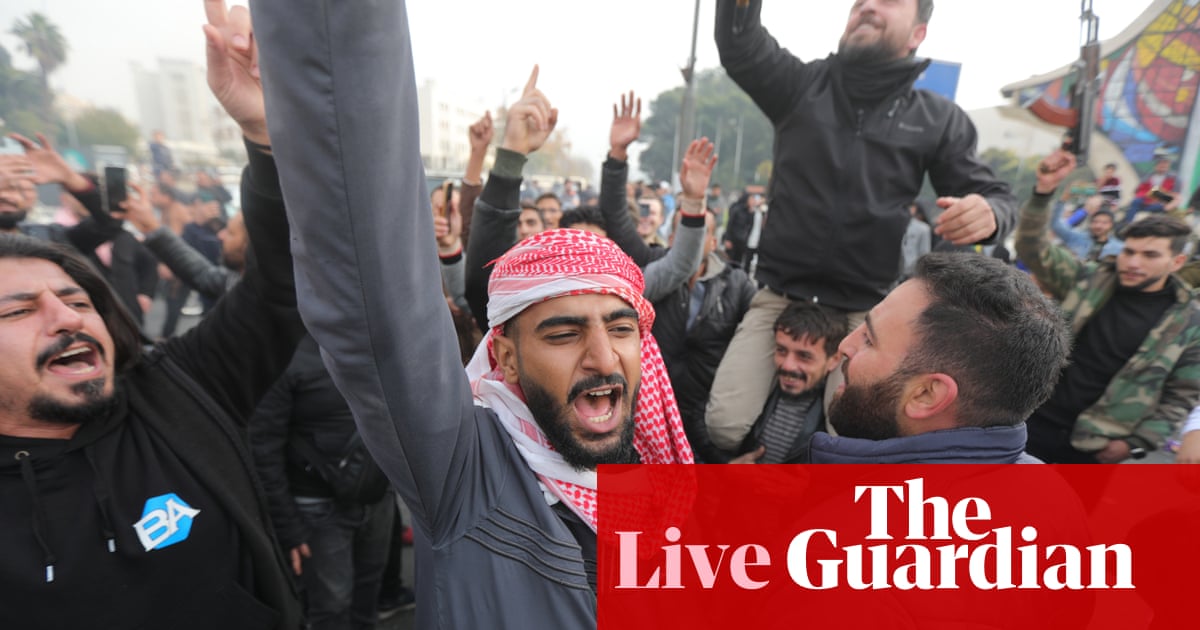Key events
Israeli media reports that defense minister Israel Katz has ordered the Israeli military to strike at targets inside Syria including “surface-to-air missiles, air defence systems, surface-to-surface missiles, cruise missiles, long-range rockets, and coast-to-sea missiles.”
In a statement the recently appointed minister said he had ordered the military to create a “security zone free of heavy strategic weapons and terror infrastructure.”
Speaking on Sky News in the UK this morning, senior minister Pat McFadden has suggested that the country may consider changing the status of Hayat Tahrir al-Sham, which the UK currently designates as a proscribed terror group.
Reuters reports he told viewers “We will consider that. And I think it will partly depend on what happens.”
The British government proscribed Hayat Tahrir al-Sham in May 2017 as an alternative name for al-Qaida.

Archie Bland
This morning our First Edition newsletter poses the question what next for Syria. My colleague Archie Bland writes:
However jubilant Syrians are today about the end of a dark chapter of their history, they know that the next is yet to be written. Because of Hayat Tahrir al-Sham’s (HTS) past relationship with al-Qaida and the human rights abuses carried out in the areas that it has ruled, many are sceptical that it will act as the guarantor of a transition to a pluralist and democratic state. And HTS chief Abu Mohammed al-Jolani himself is viewed as a terrorist by the US and others.
But some say there are reasons to be hopeful. Dareen Khalifa, a Syria expert at Crisis Group, wrote on X last week that HTS leadership had told her they were considering dissolving the group “to enable full consolidation of civilian and military structures in new institutions reflecting the breadth of Syrian society”.
Fears of reprisals came through clearly in coverage from the historically pro-government al-Watan newspaper, which hailed “a new page for Syria” and said the media should not be blamed because it “only carried out instructions”.
But on Sunday, in what appeared to be coordinated statements, Syria’s prime minister Mohammad Ghazi al-Jalali said that he was at his home and promised to cooperate with “any leadership chosen by the Syrian people”, while rebel leaders said that public institutions remained under the supervision of the “former prime minister”. Jolani, meanwhile, said that his fighters should not harm “those who drop their weapons” and assured women and Christians that he does not intend to impose strict Islamic law.
Whether HTS maintains that approach or is able to prevail on other factions to do the same “remains to be seen,” Khalifa wrote. “Given their history and jihadist roots, they will face a huge challenge in addressing the understandable concerns of many Syrians.”
Read more here: Monday briefing – How the decade-long war in Syria ended almost overnight
Reuters reports that China’s foreign ministry spokesperson has called for the restoration of stability and order in Syria and the search for a “political solution” as soon as possible.
Overnight Israel’s military issued handout pictures of its troops operating in the Hermon area of Syria.
After the ground operation in Gaza which was launched in October 2023, and the incursions into southern Lebanon which began in October 2024, Syria is the third country or territory that Israeli troops have invaded in the last 14 months.
The “domino effect” rippling through the Middle East
Grappling with the rapidly evolving geopolitical dynamic in the Middle East?
The Guardian’s Bethan McKernan has this analysis on how Hezbollah’s war with Israel left the Assad regime fatally exposed.
“It was not a coincidence that the Syrian group Hayat Tahrir al-Sham (HTS) began its push for the city of Aleppo on the same day that Israel and Hezbollah agreed a ceasefire to end the fighting in Lebanon,” she writes.
“The domino effect set in motion by Hamas on 7 October 2023 is still rippling through the Middle East, this weekend resulting in the spectacular downfall of Syria’s president, Bashar al-Assad.”
Full analysis here:
Quintessential scenes of a fallen, dictatorial regime
Assad’s palace burned and looted in the hours after he fled the country. Below is a photo gallery of how it unfolded, chandeliers and all.
Distant dreams of Syrian exiles could soon be realised
A compelling dispatch from the Guardian’s Ruth Michaelson on the dreams of Syrian exiles who have been longing to return home.
“The Kawases have lived just two hours from Aleppo in the Turkish city of Gaziantep for almost a decade, only able to visit their home town in their dreams. And even then, said Haleem, these were always punctuated with memories of being chased through the streets by Assad’s security forces as they did during those early protests.
Thoughts of returning were also a distant dream until they saw pictures of insurgents approaching the edge of Aleppo. Change was coming, they decided.”
Read the full story here:
UN security council to convene for emergency meeting
The UN security council is expected to convene for an emergency meeting on Syria today, a day after the country’s deposed leader fled the country and was granted asylum on “humanitarian grounds” in Russia.
Hayat Tahrir al-Sham (HTS), the Islamist group that led the offensive in Syria is still designated as a terrorist group by the US, Turkey and the United Nations.
‘I haven’t seen the sun until today’, says freed prisoner
Amid the rapid insurgency that has swept through Syria and led to toppling of president Assad, tens of thousands of people held in prisons in the country have been freed, reports the Associated Press.
Among those released as rebels forces gained control was prisoner Bashar Barhoum, a 63-year-old writer who was due to be executed on Sunday.
Instead, writes the Associates Press, he walked into the Damascus sunshine.
“I haven’t seen the sun until today,” he said after walking in disbelief through the streets of Damascus. “Instead of being dead tomorrow, thank God, he gave me a new lease of life.”
Videos shared widely across social media showed dozens of prisoners running in celebration after the insurgents released them, some barefoot and others wearing little clothing. One of them screaming in celebration after he learned the government had fallen.
Syria’s prisons have been infamous for their harsh conditions. Torture is systematic, say human rights groups, whistleblowers, and former detainees. Secret executions have been reported at more than two dozen facilities run by Syrian intelligence, as well as at other sites.
Syria’s notorious Sednaya prison
As the brutal regime of Bashar al-Assad fell, the doors of the country’s notorious prisons have opened, including those of Sednaya, a facility described as a “human slaughterhouse”.
Across the country prisoners, bewildered and exultant, have poured out of their cells.
But it’s not clear if all detainees are free.
Since the beginning of the crisis in Syria in 2011, Sednaya prison, which is about 30 kilometres from the capital, had become the final destination for both peaceful opponents of the authorities as well as military personnel suspected of opposing the regime.
On Monday Syria’s White Helmets civil defence forces said they were investigating claims of “hidden underground cells” in the prison that, according to accounts from survivors, could be holding further detainees.
The White Helmets said they had deployed five specialised emergency teams, consisting of search and rescue units, wall-breaching specialists, iron door-opening crews, trained dog units, and medical responders, the group said in a post on X.
The White Helmets has deployed 5 specialized emergency teams to Sednaya Prison to investigate hidden underground cells, reportedly holding detainees according to survivors. The teams consist of search and rescue units, wall-breaching specialists, iron door-opening crews, trained…
— The White Helmets (@SyriaCivilDef) December 8, 2024
Hello and welcome to our live coverage of events in Syria. I’m Kate Lamb. It is almost 9am in Damascus on the day after the fall of the Assad regime.
In a series of extraordinary events on Sunday, rebels advanced into the capital unopposed and President Bashar al-Assad fled to Russia. He has since been granted asylum on “humanitarian grounds”, according to a Kremlin source, Russian news agencies reported.
Join me as we follow the day’s events. Here is a summary of the most recent developments:
-
Syrian anti-government rebels declared they had ousted President Bashar al-Assad after seizing control of Damascus on Sunday, in an astonishing end to his family’s decades of autocratic rule after more than 13 years of civil war.
-
The ousted Syrian president is now in Russia, according to a Kremlin source, where he has been granted asylum on “humanitarian grounds”.
-
The United Nations security council will convene on Monday afternoon for an emergency closed door meeting on Syria in the aftermath of the ousted president fleeing the country.
-
Thousands of Syrians have rallied across cities in Europe in the wake of the news, waving flags and barely able to contain their joy at Assad’s downfall. Similar celebrations have also been seen in Syrian embassies, including in Malaysian capital Kuala Lumpur.
-
As armed rebels swept cities across Syria, flinging open detention facilities where rights groups estimated that at least 100,000 people were considered missing or forcibly disappeared since 2011 at the hands of the state. This included the Sednaya military prison, a facility notorious as the site of particularly brutal and humiliating methods of torture.
-
UN secretary-general António Guterres on Sunday praised the end of Syria’s “dictatorial regime” and called on the country to focus on rebuilding.
-
Joe Biden said the sudden collapse of the Syrian government was a “fundamental act of justice” after decades of repression, but that it’s “a moment of risk and uncertainty” for the Middle East. The US Central Command said its forces conducted dozens of airstrikes on Islamic State targets in central Syria on Sunday.
-
The US president also said it believes missing American journalist Austin Tice, who disappeared 12 years ago near the Syrian capital, is alive and “we think we can get him back”.
-
Rebel commander Abu Mohammed al-Jolani said in a statement read on Syria’s state TV that there is no room for turning back. “The future is ours,” his statement said. Al-Jolani, commander of Hayat Tahrir al Sham (HTS), reportedly said that all state institutions would remain under the supervision of al-Assad’s prime minister until they were handed over officially.
-
The Israeli military has issued a warning to five towns in southern Syria, calling on residents to stay at home “until further notice” due to ongoing combat in the area.
-
Arab states will seek to avert the threat of a reignited Syrian civil war by starting an open dialogue with all the forces on the ground to ensure any transition is inclusive of all Syrians regardless of ethnicity, Qatar’s foreign ministry has said.












